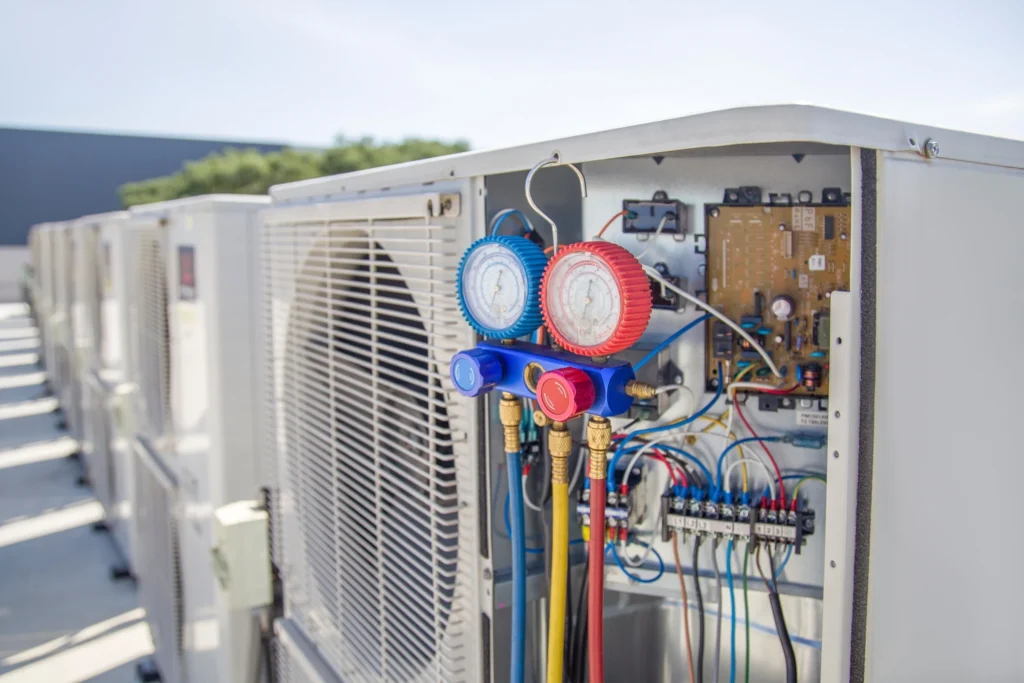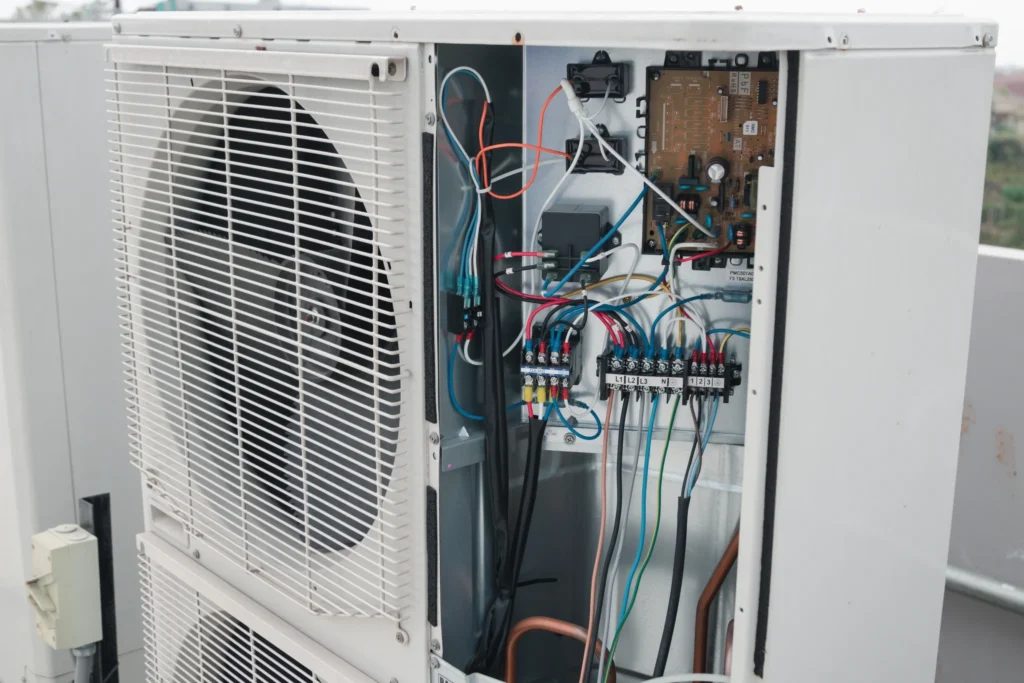Why Is My AC Compressor Not Turning On?
When you’re in the middle of a heatwave, the last thing you want to encounter is your home AC compressor not turning on. But don’t worry. We’ll help you understand why this is happening and what steps you can take to get your AC back up and running.

An HVAC compressor not turning on generally results from either power failure, electrical problems, or mechanical issues. By understanding these causes, you can diagnose any issues and decide whether you need professional assistance or if there are simple DIY fixes available. So, let’s dive right in!
Overview of AC Compressors and Their Function
Overall, AC compressors are the heart of the air conditioning system. They take the refrigerant and pressurize it to help it flow through the system and cool down the air in your home.
The compressor is powered by an electric motor that starts up when you turn on your AC unit. This helps move heat from inside your home outside, thus cooling it down.
There are four main types of AC compressors:
- Reciprocating
- Scroll
- Rotary
- Centrifugal
Each has unique features and capabilities, as well as its own set of advantages and disadvantages. So, be sure to do plenty of research before deciding which type is right for you! Ultimately, no matter which type of compressor you choose, they all perform one essential job: keeping your home cool during those hot summer months!
How Do I Know if There’s an Issue With My AC Compressor?
One sign of an issue with your AC compressor is if it won’t turn on when you adjust the thermostat settings for cooling mode. If you hear any strange noises from your unit when it tries to turn on or off, this could also indicate a problem.
If you notice either of these signs, we highly recommend calling a professional HVAC technician for assistance as soon as possible so they can inspect and properly diagnose any potential issues with your air conditioning system.
While we’ve listed many of the most common problems in this article, there are many other reasons that could cause AC compressor problems. If you suspect something is wrong beyond the issues listed below, it would be best to enlist a professional’s help.
Trying to make repairs that you don’t fully understand can be unsafe, so it’s better to be careful if you’re not confident you can do something.
Why Is My AC Compressor Not Turning On?
There are several potential reasons why your AC compressor won’t turn on. There may be:
- An electrical issue preventing power from reaching it
- Something wrong with one of its components (like a relay switch or capacitor motor)
- Low levels of Freon due to a leak in one of its hoses
- Debris, like dirt or leaves, blocking up its interior parts
- An obstruction at its fan blades preventing them from spinning fast enough for proper operation
In any case, if you’re having trouble getting your AC compressor up and running again, you should probably contact an experienced technician. They can diagnose and fix any underlying problems quickly so that you can enjoy cool temperatures inside once more!
Common Causes of AC Compressor Problems
While we’ve mentioned some of the most common causes for an AC compressor not turning on, it could be caused by various issues. Below, we’ll discuss some of the most common causes for this type of problem.
Power Outage
A power outage is one of the most common causes of an AC compressor not working. If your compressor isn’t starting, it might not be getting power from your circuit breaker or fuse box. First check that the power is on, then move on to the circuit breaker.
Blown Fuses or Tripped Breakers
Blown fuses and tripped breakers can happen due to a power surge in the area, bad wiring in the house, or overloaded electrical circuits.
To check if this is the cause, locate your circuit breaker box and look for any switches that are switched off. If you find one that has been flipped off, switch it back on and see if that resolves the issue with your AC compressor not starting up.
Refrigerant Leaks
Refrigerant leaks are another potential cause. If you notice any sort of water pooling near the unit, this could indicate a slow leak somewhere inside the system.
Refrigerant keeps your air conditioner cool and your compressor won’t turn on at all if the refrigerant levels are too low. A professional technician can help you identify if there’s a leak and how to go about fixing it properly.
Bad Wiring or Electrical Issues
Faulty wiring can also be a contributing factor if you find your AC compressor not working. This can include loose connections between wires, corrosion buildup on terminals, or even damaged insulation around wires.

If any part of the wiring is compromised, it can prevent the proper flow of electricity and keep your air conditioner from engaging properly with its compressor motor.
Faulty Thermostat Settings
Faulty thermostat settings can also be an issue when your AC compressor isn’t turning on.
For example, if your thermostat is set too low, then it won’t trigger the AC compressor to turn on as it won’t recognize that there’s a need for cooling.
To test this out, try setting the temperature higher than what you currently have it at and see if that gets the AC compressor running again.
Troubleshooting Your AC Compressor Issue
If any of the abovementioned issues are the reason for your AC compressor not working, then repairing the problem should be relatively simple. Let’s take a look at some of the steps you can take to restore your AC compressor to working order.
Step 1: Verify That the Thermostat Is Set to ‘Cool’ Mode
The first thing you should do when troubleshooting why your AC compressor isn’t turning on is to verify that the thermostat is set to ‘Cool’ mode. Ensure that the temperature you’ve selected is lower than the current temperature of your home and that the fan setting is turned to “Auto.” If all looks good there, move on to step two.
Step 2: Check for a Tripped Breaker or Blown Fuse in the Electrical Panel
Next, check for a tripped breaker or blown fuse in your home’s electrical panel. Begin by visually inspecting all breakers or fuses for signs of being tripped or blown (usually, a switch will be in an “off” position if it’s tripped).
You should also try resetting the breakers, as sometimes they can become tripped without any visible sign. Simply switch the switches off one by one, then return them to the on position.
If you notice a blown fuse, or another problem with the breakers, contact a qualified electrician to diagnose and fix the issue.
Step 3: Inspect for Any Visible Signs of Damage on Wiring or Connections
Damage to the wiring or connections can be a major cause of an AC compressor not turning on. To determine if this is the problem, start by inspecting all electrical connections and wiring from the unit to the thermostat control center.
Ensure that:
- All wires are properly connected
- There’s no visible discoloration or corrosion anywhere,
- Any insulation looks intact.
If you don’t feel comfortable doing this yourself, it’s always best to call in a professional HVAC technician who can help with more advanced troubleshooting and repairs.
Check for Refrigerant Leaks Around the Unit
Also, check for refrigerant leaks around the unit itself. You should be able to see liquid pooling around the machine. However, leaks can be difficult to detect without specialized equipment.
So, if you do suspect a leak, it’s important to have your AC checked out by an experienced technician as soon as possible. Leaks can cause serious damage to your unit over time and should be taken care of immediately before they become too costly to repair.
The technician should also check the level of refrigerant in your AC system while they’re there – if it’s too low, then that could also be why your compressor isn’t turning on.
Examine the Air Filter for Blockages or Debris
If your AC compressor isn’t turning on, check your air filter.
A clogged or dirty air filter can block the flow of air, causing the compressor not to turn on. To check if this is the issue, open up your unit and examine the air filter for any debris or blockages.
If you find any obstructions, simply remove them with a vacuum cleaner and replace the filter with a new one. This should solve the issue.
Conclusion
If, after following these steps, your AC compressor still isn’t turning on, it could be due to a faulty control board or wiring. If you’re unsure how to inspect and replace these components, it’s best to call a certified HVAC specialist.
Handling a malfunctioning AC unit can be a difficult and time-consuming task. But, with proper knowledge and care, you should have no problem getting your AC running smoothly again.
